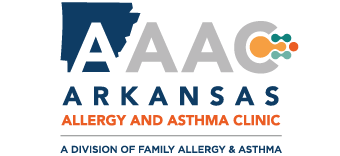Asthma Attacks
When you have asthma, airway inflammation and swelling cause the airways to be overly sensitive or “twitchy.” This twitchiness causes the narrowing and blockage of the airways. As the inflammation increases, the airways become more sensitive and overactive.
During an asthma episode, the mucus-producing cells within the airway increase their output and mucus plugs the airway. The combination of airway narrowing, mucus plugging, and airway inflammation can block portions of the airway entirely. Air becomes trapped in the alveoli (air sacs at the end of the bronchioles). This trapped air cannot provide for the proper exchange of oxygen and carbon dioxide. Trapped air leads to hypoxia (low oxygen content) in the body.
Air trying to pass through the narrowed tubes filled with mucus may produce wheezing. Wheezing is a high-pitched whistling sound, often associated with asthma.
We recommend keeping track of your history of asthma attacks or other symptoms and let our allergists know how often and what time of day these attacks happen.
Symptoms of Asthma
Coughing is usually the most common and may be the only symptom. Other symptoms of asthma include:
- a persistent cough
- chest tightness
- shortness of breath
- decreased endurance
Asthma symptoms often happen at night and in the morning but can also happen at any time. If you think you have asthma, you need to be evaluated by a board-certified allergy and asthma specialist.
Lasting Effects of Asthma
Severe effects of asthma may include loss of elasticity of the lungs due to air trapping and low oxygen; this is called “airway remodeling.” Children may not grow as well due to long-term trapped air and low oxygen content in the body, and asthma may cause irritability and fatigue for all ages.
Don’t wait any longer to get a medical diagnosis and an effective treatment plan. If you think you or a family member may have asthma, schedule an appointment right away.
